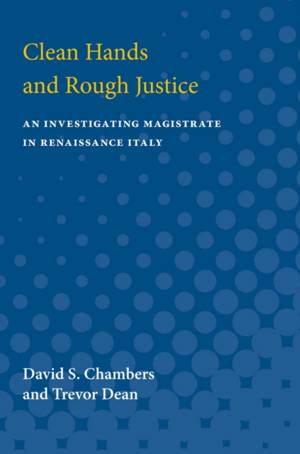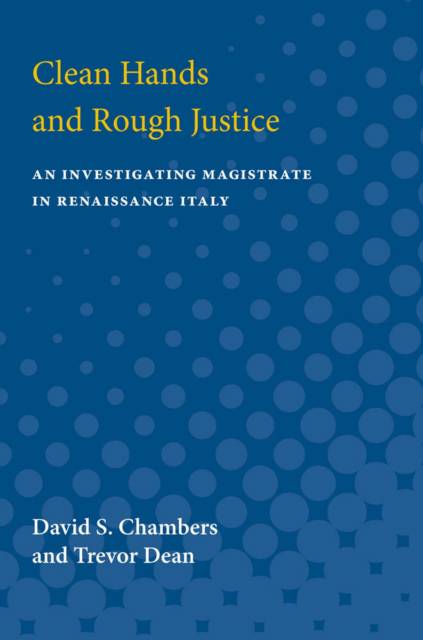
- Retrait gratuit dans votre magasin Club
- 7.000.000 titres dans notre catalogue
- Payer en toute sécurité
- Toujours un magasin près de chez vous
- Retrait gratuit dans votre magasin Club
- 7.000.0000 titres dans notre catalogue
- Payer en toute sécurité
- Toujours un magasin près de chez vous
Clean Hands and Rough Justice
An Investigating Magistrate in Renaissance Italy
David S Chambers, Trevor Dean
Livre broché | Anglais
60,95 €
+ 121 points
Description
It is rarely possible to write biographies of lay people who lived in the Middle Ages. While accounts of clerical, royal, and military life are many, the wider populace has remained in relative obscurity. In Clean Hands and Rough Justice: An Investigating Magistrate in Renaissance Italy, David S. Chambers and Trevor Dean present an extraordinary and previously unknown character from Renaissance Italy, Beltramino Cusadri (ca. 1425-1500). This judge was known as the "terrible commissioner," and he spent most of his professional life acting as criminal investigator and legal adviser to two princely dynasties--the Gonzaga of Mantua and the Este of Ferrara.The authors investigate and compare the judicial institutions and social conditions in which he worked, the criminal cases that he investigated, and his successes and failures. Their combined presentation of the figure and mentality of Beltramino amounts to something unprecedented in Italian Renaissance historiography: the portrait of a professional man, employed to combat rising crime but accused of corruption and tyranny by the entrenched interests that he faced. The book follows the major phases of Beltramino's career along with a broader exploration of the legal history of Renaissance Italy.In his long life Beltramino Cusadri wrote hundreds of letters to his employers, and it is upon these letters that this book is based. These letters, with their wry, colorfully worded expressions, are liberally quoted and provide unique insight into the career, activity, and attitudes of a major Renaissance bureaucrat. The letters of his employers in return, and of many other judges and officials, along with the evidence of legislation and prosecution, are also drawn upon to examine a variety of themes, from the progress of lawmaking and the pattern of criminality, to the problems of policing and the changing forms of punishment. These provide an extraordinarily vivid picture of face-to-face realities that make an important cont
Spécifications
Parties prenantes
- Auteur(s) :
- Editeur:
Contenu
- Nombre de pages :
- 340
- Langue:
- Anglais
Caractéristiques
- EAN:
- 9780472750689
- Date de parution :
- 01-01-97
- Format:
- Livre broché
- Format numérique:
- Trade paperback (VS)
- Dimensions :
- 152 mm x 229 mm
- Poids :
- 503 g

Les avis
Nous publions uniquement les avis qui respectent les conditions requises. Consultez nos conditions pour les avis.






